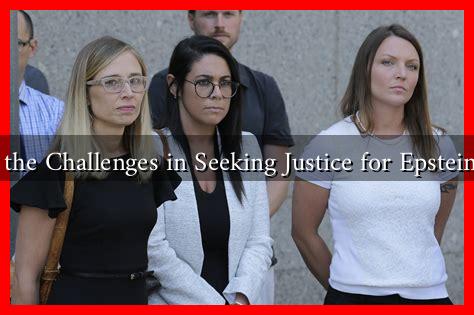-
Table of Contents
What Are the Challenges in Seeking Justice for Epstein’s Victims
The case of Jeffrey Epstein, a financier and convicted sex offender, has drawn significant media attention and public outrage due to the heinous nature of his crimes and the high-profile individuals associated with him. Epstein’s victims, many of whom were minors at the time of their abuse, face numerous challenges in their pursuit of justice. This article explores the multifaceted obstacles these survivors encounter, from legal hurdles to societal stigma.
Legal Complexities and Barriers
One of the most significant challenges in seeking justice for Epstein’s victims lies in the legal complexities surrounding their cases. The following factors contribute to these difficulties:
- Statute of Limitations: Many victims may find that the statute of limitations has expired for their claims, preventing them from pursuing criminal charges. In some jurisdictions, the time frame for filing civil suits can also be limited.
- Legal Representation: Access to competent legal representation can be a barrier.
. Many victims may not have the financial resources to hire experienced attorneys who specialize in sexual abuse cases.
- Victim Blaming: The stigma surrounding sexual abuse can lead to victim-blaming attitudes, which may discourage survivors from coming forward or pursuing legal action.
Psychological and Emotional Challenges
The psychological impact of sexual abuse can be profound and long-lasting. Victims often face emotional challenges that complicate their pursuit of justice:
- Trauma and PTSD: Many survivors experience post-traumatic stress disorder (PTSD), anxiety, and depression, which can hinder their ability to engage in legal proceedings.
- Fear of Retaliation: Victims may fear retaliation from powerful individuals associated with Epstein, which can deter them from speaking out.
- Shame and Isolation: The societal stigma surrounding sexual abuse can lead to feelings of shame and isolation, making it difficult for victims to seek support or legal recourse.
Media Influence and Public Perception
The media plays a crucial role in shaping public perception of high-profile cases like Epstein’s. However, this influence can be a double-edged sword:
- Media Sensationalism: The sensationalized coverage of Epstein’s case can overshadow the voices of the victims, reducing their experiences to mere headlines.
- Public Scrutiny: Victims may face intense public scrutiny, which can be intimidating and may discourage them from coming forward.
- Misrepresentation: Misrepresentation of the victims’ stories in the media can lead to misunderstandings and further stigmatization.
Institutional Failures and Accountability
Institutional failures have also played a significant role in the challenges faced by Epstein’s victims:
- Law Enforcement Inaction: There have been numerous allegations of law enforcement agencies failing to adequately investigate Epstein’s crimes, which can leave victims feeling unsupported.
- Judicial System Bias: The judicial system may exhibit bias, particularly when powerful individuals are involved, leading to a lack of accountability for perpetrators.
- Non-Disclosure Agreements: Many victims were reportedly coerced into signing non-disclosure agreements (NDAs), which can prevent them from speaking out about their experiences.
Case Studies and Statistics
Several case studies highlight the challenges faced by Epstein’s victims. For instance, Virginia Giuffre, one of the most vocal survivors, has faced numerous legal battles against powerful individuals, including Prince Andrew. Her case exemplifies the difficulties victims encounter when confronting influential figures.
Statistics also reveal the broader context of sexual abuse. According to the Rape, Abuse & Incest National Network (RAINN), an American is sexually assaulted every 68 seconds, and 1 in 6 women and 1 in 33 men have experienced an attempted or completed rape in their lifetime. These figures underscore the prevalence of sexual violence and the urgent need for systemic change to support survivors.
Conclusion
Seeking justice for Epstein’s victims is fraught with challenges that stem from legal complexities, psychological barriers, media influence, and institutional failures. The journey toward justice is not only about holding perpetrators accountable but also about addressing the systemic issues that hinder survivors from coming forward. As society continues to grapple with the implications of Epstein’s case, it is crucial to amplify the voices of survivors and advocate for reforms that prioritize their rights and well-being. Only through collective action can we hope to create a more just and supportive environment for all victims of sexual abuse.
For more information on supporting survivors of sexual abuse, consider visiting RAINN.





